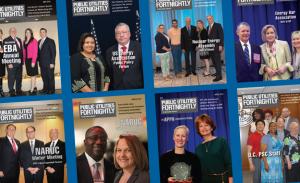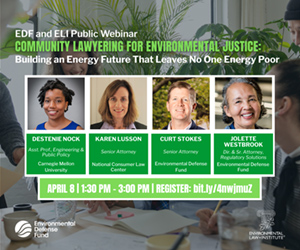19 Voices Among the 190 Authors and Interviewees in PUF Last Year
But one other source vies for recognition as well. That, of course, is nuclear energy. It's the other white meat, so to speak.

Tim Echols, "Nuclear Energy: Tastes like Chicken," September's PUF
FERC's efforts to get capacity markets "right" in these regions have instead led to endless - and futile - tinkering. As the problems with mandatory capacity markets have popped up, FERC has been chasing them like the arcade player in a game of whack-a-mole.
Delia Patterson and Harvey Reiter, "FERC Chasing the Uncatchable," May's PUF
One of the protesters was handing out flyers to the FERC staff as they entered the building. The flyer said: We are not against this particular infrastructure. We are against all infrastructure... It's NOPE. Not on Planet Earth... They don't think there should be any natural gas infrastructure anywhere. Of course, the Natural Gas Act is not written in that way.
Tony Clark, with Pat McMurray, "Energy People: Tony Clark," July's PUF
Even though I started as a junior engineer, in the meter repair shop, I advanced and progressed to becoming a field engineer. It was in the outside construction area, putting gas pipes in the ground. I was able to learn the gas business from the 'ground floor.'
Bob Catell, with Steve Mitnick, "Energy People: Bob Catell," September's PUF
I was a young lawyer with no reputation, so I went down to New Orleans a day or two earlier and talked to people, and I developed what I though was a very compelling strategy. Halfway through delivering it, the president of the City Council, who was the former chief of police, interrupted me and asked what sports I had played when I was younger... Later, he and many others told me that after the interview rather than focusing on my so-called compelling strategy, he said I want the guy that used to box, because we're going to get into a big fight with the utility and we need somebody that's a fighter.
Clint Vince, with Pat McMurray, "Energy People: Clint Vince," December's PUF
Helicopter safety, of course, was very important for the project. And we worked in the desert and the mountains. Heat illness is something we're always concerned about, that people are properly trained and stay hydrated. Rattlesnakes were prevalent out there. We had to have training on how to deal with rattlesnakes and mountain lions, and all those things you might encounter out in the wilderness.
Ken Gerling, with Steve Mitnick, "Energy People: Ken Gerling," July's PUF
I [refereed] over one thousand matches for the United States Soccer Federation in my career. Every so often a player or coach would say something rude to me. You're trained not to react to that... But it really helped me when I was an occasional expert witness for my company.
Stan Garnett, with Steve Mitnick, "Energy People: Stan Garnett," August's PUF
How then did environmentalists come to view nuclear as bad for the environment? Starting in the mid-sixties, a handful of Sierra Club activists feared rising migration into California would destroy the state's scenic character. They decided to attack all sources of cheap, reliable power, not just nuclear, in order to slow economic growth... But these activists had a problem: their anti-growth message was deeply unpopular with the Californian people. And so anti-nuclear activists changed their strategy. They worked hard instead to scare the public by preying on their ignorance... This included publicizing images of victims of Hiroshima and photos of babies born with birth defects. Millions were convinced a nuclear meltdown was the same as a nuclear bomb.
Michael Shellenberger, "How the Environmental Movement Changes its Mind on Nuclear Power," May's PUF
Unfortunately, a book which began on a promising note, takes its reader on a journey that abounds in sweeping generalizations, unsupported statements, conjecture and speculation. The narrative was marred by invective... By the time I finished reading the book, the grid had become a grind.
Ahmad Faruqui, "Book Review: Gretchen Bakke's Meditation on The Grid," October's PUF
Yeah, I felt confident, but, I'm human. I have doubts and concerns about things. I never felt our board lost confidence in the management team because the [merger] transaction didn't pass through [the D.C. Public Service Commission] the first time. It was much more of, 'Let's get focused on what we have to do to get this back on track, but also be super prepared if the deal does, in fact, fail.'
Joe Rigby, with Tom Linquist, "Leadership Lyceum Podcast Summary: Reflections from the Room Where It Happened," December's PUF
People [in Chad] didn't have light bulbs in their home. Women would start in the morning and use a mortar and pestle to grind the grain. And they would walk miles to get water. The amount of disease was great. I had kids who got cuts and got infected. There I was, at twenty-one years old [in the Peace Corps], trying to help my students who had infected legs...
Audrey Zibelman, with Pat McMurray, "Energy People: Audrey Zibelman," December's PUF
Sensors and augmented reality give the worker access to super-human senses that can detect and warn about dangers.
John Simmins, "EPRI Explores Augmented Reality to Improve Grid Reliability," June's PUF
Utilities should carefully evaluate new technologies. And balance their desire to move quickly, with the possibility of being a fast follower rather than a buggy beta site. Sometimes it is better to take the time to train the dog in the yard before letting it wander freely.
Alan Feibelman and Gerry Yurkevicz, "Transitioning to the Utility of the Future," September's PUF
It was Tom's presentation at our recent conference that got me thinking about how Las Vegas is a model of energy efficiency for the country. Who knew? But it's one of the surest bets you'll find in that city.
John Hargrove, "Vegas Energy, Baby," November's PUF
The authors are entitled to argue that rooftop solar panels offer such an unalloyed public benefit relative to other energy sources that a huge subsidy over and above the one Congress has already provided is warranted. They did not attempt to make that case. What is not appropriate is distracting decision-makers and the public with contrived arguments that hide the existence of the subsidy and regressive cost shift, packaged with gratuitous bashing of utilities that have raised a serious issue in open regulatory proceedings.
David Raskin, "A Rose by Any Other Name," March's PUF
[Climate change legislation] could have passed in the Senate, but the White House was MIA. Because they had just passed health care. They weren't prepared for another major legislative push. There is a lot you can read into the fact that they took a pass.
Jim Rogers, with Steve Mitnick, "Energy People: Jim Rogers," August's PUF
As my book reveals, the electric power industry has proved attractive to smart hyper-ambitious players seeking a platform to control people, institutions and markets.
Jeremiah Lambert, "Writing 'The Power Brokers,'" May's PUF.



